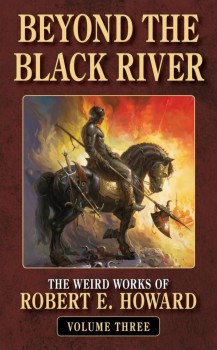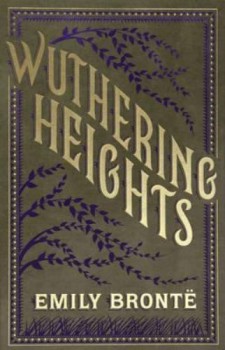Rogue Blades Presents: Sometimes a Good Hero is Hard to Find
 Recently I’ve been reading Beyond the Black River, a collection of Robert E. Howard tales published by Wildside Press. Within those pages one can find a couple of horror tales but also a handful of Conan the Cimmerian yarns, including the short story which gives this book its title.
Recently I’ve been reading Beyond the Black River, a collection of Robert E. Howard tales published by Wildside Press. Within those pages one can find a couple of horror tales but also a handful of Conan the Cimmerian yarns, including the short story which gives this book its title.
When reading Beyond the Black River, the book or the story, it is obvious not only who the protagonist happens to be, but also the hero. The two figures are not always the same individual within a tale. For instance, Conan features large in most of the stories here, and he is the hero in at least four of the tales, but he is not always the protagonist. Sometimes Howard would pen a Conan tale told from another point of view. But whatever the point of view, Howard was mainly a writer of action and adventure, thus he wanted there to be little question about his hero in any given story.
Also of late, like millions stuck at home, I’ve been watching my fair share of television, which is actually unusual for me. One show I’ve watched, again like millions, is The Mandalorian. Here, too, it is obvious who wears the title of hero and protagonist with the ever-helmeted “Mando” performing both roles. I also caught up on the show Justified, a modern Western of sorts featuring Timothy Olyphant as Deputy U.S. Marshall Raylan Givens in my home state of Kentucky (it was kind of fun to watch all the things the show got wrong about the Bluegrass State); once more it was not difficult to pick out the hero and protagonist, here the same individual in Raylan Givens.
However, earlier in the year I read novels and stories and watched shows in which it was not so easy to pick out a hero.
For instance, watching the super hero show The Boys on Amazon Prime, there are a whole lot of bad people but not a lot of real heroes. Even a regular protagonist is difficult to pinpoint as this show has more of an ensemble cast with the focus on characters shifting. Early on in the series, Hughie Campbell (portrayed by Jack Quaid) is the protagonist, but by the end of the first season Hughie has been taken in as part of the broader cast. Also, while Hughie occasionally does something that is heroic, he generally is too reticent to be a regular hero. Still, he usually tries to do what’s right, at least for the moment, and maybe that’s all we can ask for a modern television hero. And I don’t want to leave out other characters, for Starlight (Erin Moriarty) is usually the most heroic of the “supes” and she also tries to do what is right, but she’s not exactly the hero of the show. Karl Urban’s Billy Butcher character plays large on the screen whenever he appears, and he does sometimes do the right thing, even the heroic thing, but I don’t think anyone who has watched the show would consider Butcher a hero, especially as his motives usually come from pain, rage and sometimes even selfishness.
In a show like The Boys, it seems the protagonist shifts from episode to episode, if not scene to scene. It also seems there is no regular, always dependable heroic figure.
Which reminds me a bit of Breaking Bad. Breaking Bad is obviously a tragedy what with the Walter White (Bryan Cranston) character using his talents as a chemist for his own purposes which lead to his downfall and the destruction of nearly all he loves. White is mostly the protagonist here, though in rare episodes other characters fill that roll, but there is no true, regular overriding hero throughout this series. Oh, there are some heroic characters, to be sure, but few who stand forward and stand up constantly as a hero. White himself is ultimately a villain. The closest character to a traditional hero would be that of DEA Agent Hank Schrader (Dean Norris), but Hank is not the main character throughout this show and ultimately he … well, I don’t want to spoil too much … let’s just say Hank doesn’t accomplish what he hoped to accomplish, making him also a tragic figure. For my money, the true hero of Breaking Bad is Walter White Jr. (RJ Mitte); Walt Jr. is nearly a secondary character within the series, but he plays a pivotal role throughout and is perhaps the only true “clean” character in the entire show, finally having to play the hero even against someone he had loved and admired all his life. And I’m not forgetting the likable Jesse Pinkman (Aaron Paul); Jesse sometimes gets to play protagonist, and arguably he does a few heroic deeds, but he also does his fair share of heinous acts out of gullibility or misplaced loyalty.
 Returning to literature and another book I read this year, the novel Wuthering Heights offers its own take on a hero. Or does it? Heathcliff is arguably the protagonist, though the story is told from multiple points of view. At the very least, one could say Heathcliff is the central character of the novel. For those unfamiliar with the book (and I’ll try not to give anything away), the character Heathcliff is wronged in the first half of the tale, then he vanishes for some few years only to return powerful and wealthy. And then he seeks revenge not only upon those who he believes have wronged him, but even upon their children. It’s a matter of vengeance taken to extremes. I tend to think of the book as if a maddened version of the Count of Monte Cristo (and he was pretty mad already) found himself dumped into a Jane Austen novel. If written for the modern world, Wuthering Heights would likely be considered a psychological thriller or even horror, but for its time of publishing (1847) it is something of a gothic novel. There are those who call it a romance novel, who claim Heathcliff is merely a misunderstood romantic hero, but personally, I disagree. In my opinion, Heathcliff is a monster. At best, his tale is one of tragedy. His revenge need not have gone so far, not to those who were innocent of any crimes against him. Who then, is the hero of Wuthering Heights? I’m not sure there is one. There are a number of characters who show themselves as nice, as somewhat likable, even as pitiable, but none really act in a heroic manner. As I said, Heathcliff is a villain in my eyes, the central villain to this tale, a tale in which every other character is either too weak or too disinterested or too late to stand up to the evil among them.
Returning to literature and another book I read this year, the novel Wuthering Heights offers its own take on a hero. Or does it? Heathcliff is arguably the protagonist, though the story is told from multiple points of view. At the very least, one could say Heathcliff is the central character of the novel. For those unfamiliar with the book (and I’ll try not to give anything away), the character Heathcliff is wronged in the first half of the tale, then he vanishes for some few years only to return powerful and wealthy. And then he seeks revenge not only upon those who he believes have wronged him, but even upon their children. It’s a matter of vengeance taken to extremes. I tend to think of the book as if a maddened version of the Count of Monte Cristo (and he was pretty mad already) found himself dumped into a Jane Austen novel. If written for the modern world, Wuthering Heights would likely be considered a psychological thriller or even horror, but for its time of publishing (1847) it is something of a gothic novel. There are those who call it a romance novel, who claim Heathcliff is merely a misunderstood romantic hero, but personally, I disagree. In my opinion, Heathcliff is a monster. At best, his tale is one of tragedy. His revenge need not have gone so far, not to those who were innocent of any crimes against him. Who then, is the hero of Wuthering Heights? I’m not sure there is one. There are a number of characters who show themselves as nice, as somewhat likable, even as pitiable, but none really act in a heroic manner. As I said, Heathcliff is a villain in my eyes, the central villain to this tale, a tale in which every other character is either too weak or too disinterested or too late to stand up to the evil among them.
This begs the question: Does every piece of fiction have to have a hero?
Obviously not. In the above examples, some stories include a hero as protagonist, some have heroic figures as side characters, and some have few or no heroes whatsoever. Throughout the history of literature and cinema and television, and even video games, there are plenty of stories told which do not feature a heroic figure or even include such an individual. Such stories do exist, can exist.
Looking specifically at literature, the likes of Leo Tolstoy and John Gardner considered art as a venue for showing us how to act morally. While they have their points, art can also be an example of how not to act. Seen from those points of view, moral points of view, art serves as either a positive or negative example upon our lives. Gardner recognized other forms of art, other forms of storytelling, but he considered them mere entertainment, lesser art. Tolstoy had nothing good to say of art that did not reach for morality, for his God.
This isn’t to say the only purpose of art is to teach morality, or even that the main purpose of art is such. Some would argue in favor of this moral view of art, but there are numerous other approaches.
That being said, when it comes to heroic literature or any art form which focuses upon the heroic, it is nearly impossible to ignore morality. One can argue for a set morality or one can argue that morality is situational, but there has to be some form of morality within a heroic tale. Otherwise, it wouldn’t be heroic. The hero has to strive for something positive, has to yearn for something that will improve their own situation or that of someone else, someone in need. All the while, the true hero must be willing to lose something in order to save something. Sometimes that means the hero must be willing even to risk their own life.
The core of heroic literature seeks to influence us in a positive light. All literature, or all art, might attempt to do so, but not all literature or art strives so hard to show us positive examples of the heroic, of how to act ethically, of how to sacrifice for others. Some art merely wants to entertain, some wants to share sadness or pain with us, some attempts to share other emotions, and some rare forms of art are degrading, possibly even destructive, and might not even be considered art.
So, no, not every story has to have a hero, but every heroic tale must. Even tales which aren’t necessarily heroic can have a hero, but that is not always necessary.
Why is this important?
Because heroes are important. I’m not suggesting all forms of art must be of the heroic variety, but I will vouch for the heroic itself. Heroes set examples of the good. You can argue what is “good,” but the hero generally will not do so, their morals either having been set early on or drawn forth by action and story and setting.
Heroes show us the best of ourselves. They give us something to strive toward. They might not be necessary in all literature, in every piece of art, but they are necessary for us as humans, whatever our society or culture. We need them.
And sometimes they’re just fun to read about.
Ty Johnston is vice president of the  Rogue Blades Foundation, a non-profit organization focused upon bringing heroic literature to all readers. A former newspaper editor, he is the author of several fantasy trilogies and individual novels.
Rogue Blades Foundation, a non-profit organization focused upon bringing heroic literature to all readers. A former newspaper editor, he is the author of several fantasy trilogies and individual novels.
I guess morality is a defining feature of any traditional narrative? Not because writers are inherently preachy, but because the traditional narrative demands it? So your central character is either a hero or a villain. The heroic narrative celebrates what’s best in human nature. The cautionary tale (ie, one featuring an anti-hero/villain) warns us about our darker impulses and what can happen if we succumb to them. ‘The Sopranos’, ‘Breaking Bad’ and ‘Madmen’ are all cautionary tales – that is, I wouldn’t classify them as tragedies in the strict, Aristotelian sense of the word, as none of the mcs are of noble birth or noble sentiment: they could be any of us, and therein lies their appeal.
‘Lord of the Rings’ on the other hand, is a conscious celebration of the heroic.